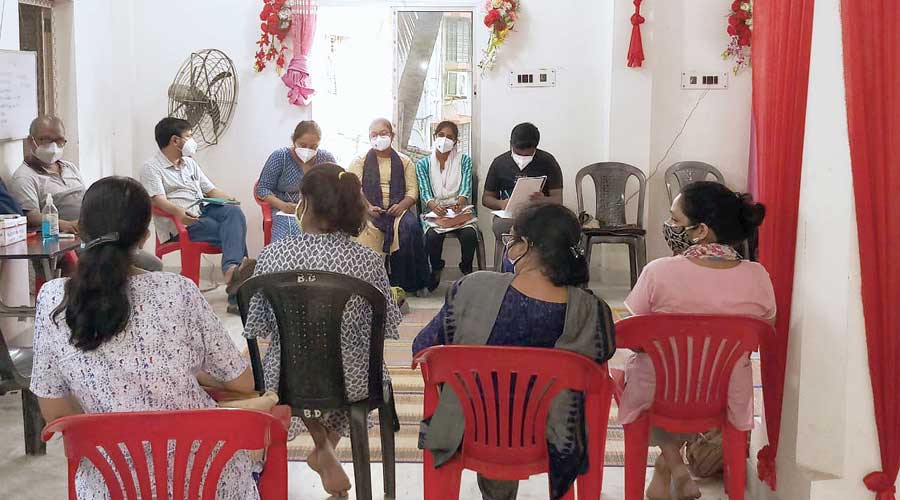A 15-year-old boy is struggling to balance his classes with his work as a caretaker of an apartment building.
A 14-year-old boy, talking incoherently in the class, revealed that he could not bear to see his parents fight every day.
The teenagers are pupils at a community learning centre for children of unorganised workers, mostly first-generation learners.
The teachers of the centre — Rokeya Siksha Kendra — have been participating in a workshop focused on mental health of such children and teenagers.
The aim of the training programme is to equip the teachers to deal with the anxieties triggered in the minds of the pupils by the pandemic.
Rokeya Siksha Kendra is the only link to institutionalised learning for around 80 children, aged between six and 18 years.
The students live mostly in slums in and around the Patuli-Briji-Garia neighbourhood, off EM Bypass. Their parents are masons, drivers, domestic help or from some other unorganised sector.
Most of them are students of a government or municipality school on paper. But the lack of economic and technological resources have left them in the lurch. They cannot attend online classes.
Many of them have to focus on assisting their parents in earning money because the Covid-19 curbs have robbed their income.
“Many children are going through a lot of stress because of the pandemic. But being cramped in a 1,000sqft flat and being cramped in an 8ftX10ft room in a slum are two different things. The socio-economic condition of these children has only worsened their mental well-being,” said Mohit Ranadip, a psychiatric social worker, who has been conducting the workshop for the teachers of Rokeya Siksha Kendra.
The sessions are held every Sunday.
Theoretical lessons are a part of the programme but the stress is on activity-oriented modules. The workshop on July 11 will focus on counselling.
The teachers at Rokeya have been dealing with several cases of mental anxiety among students.
A 15-year-old boy comes running to the class, panting and often late or just in the nick of time. On several days a week, he has to work as the caretaker of an apartment and struggles to find time to attend classes amid running errands for the residents of the building. The pandemic has robbed his father’s regular income.
Another boy, aged 14, was “speaking and behaving incoherently” at the class on multiple days. After much prodding, he told his math teacher that he was “sick and tired of seeing his parents fight every day”.
“We try to be informal in our approach with students. They confide in us because we give them a proper audience. More often than not, they don’t have anybody to share their feelings with,” said Manas Bose, who teaches mathematics at the centre.
Another student is a 17-year-old girl, who works as a domestic help. Virtually abandoned by her father, she used to pay her school fee and other educational expenses from her own earnings. Her mother died when she was six years old.
She wanted to carve out a future for herself and the long shutdown of school has multiplied her stress.
“We are learning what affects children’s minds. Not being able to attend school, being bereft of friends and neglect at home — all these are reflected in the students,” said Adharshila Chatterjee, who teaches English to students aged 16-18 at Rokeya Siksha Kendra.
Chatterjee is an assistant professor of English at the Women’s Christian College. “I am used to teaching adults. Dealing with teenagers is also a new learning experience for me,” said Chatterjee.
The workshop will also focus on imparting “life skills” to the students, said Ranadip. “Self-esteem building, assertiveness and critical thinking are important aspects of the workshop for the teachers,” he said.
Named after Rokeya Sakhawat Hossain (1880-1932), Bengal’s pioneering Muslim feminist writer, educationist and activist, the centre has been set up by a group called the Humans of Patuli, formed in 2019 to resist the Centre’s citizenship thrust at the grassroots level.
“Rokeya inculcates values that help build a society of equality, empathy, scientific temper, conscience, rights, unity of the oppressed, with awareness of co-existence in a planet we need to nurture and repair; rejecting a society of discrimination and oppression and hate,” said a member of the organisation.










